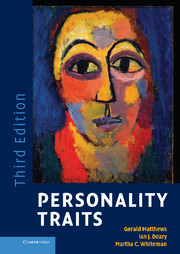Book contents
- Frontmatter
- Contents
- List of figures
- List of tables
- List of boxes
- Preface to the third edition
- Preface to the second edition
- Preface to the first edition
- Part I The nature of personality traits
- Part II Causes of personality traits
- Part III Consequences and applications
- 9 Stress
- 10 Traits and health
- 11 Abnormal personality traits?
- 12 Personality, performance and information processing
- 13 Applications of personality assessment
- 14 Conclusions
- References
- Author index
- Subject index
- References
13 - Applications of personality assessment
Published online by Cambridge University Press: 05 June 2012
- Frontmatter
- Contents
- List of figures
- List of tables
- List of boxes
- Preface to the third edition
- Preface to the second edition
- Preface to the first edition
- Part I The nature of personality traits
- Part II Causes of personality traits
- Part III Consequences and applications
- 9 Stress
- 10 Traits and health
- 11 Abnormal personality traits?
- 12 Personality, performance and information processing
- 13 Applications of personality assessment
- 14 Conclusions
- References
- Author index
- Subject index
- References
Summary
In this chapter, we consider the practical utility of personality assessment. How can we use the information provided by a personality questionnaire to help the individual or society? Personality is assessed in a variety of different contexts, including clinical, educational and occupational settings. In the first two applications, the aims of the assessment are often idiographic. The aim is to understand the unique personal circumstances that contribute to mental disorder or problem behaviour in the classroom. Personality assessment using standardised questionnaires is typically an adjunct to less formalised investigation; the trait scores of the client are themselves interpreted on the basis of clinical judgement. As we have seen in chapter 11, the typical clinical approach to diagnosis may underestimate the nomothetic predictive power of traits. In industrial and commercial settings, by contrast, there is more interest in using trait measures as a direct basis for decision-making, especially in selecting job applicants, although personality may also be treated idiographically, in career counselling for example.
This chapter is organised as follows. First, we review some principles of personality assessment, focusing on the applied issues confronting the practitioner: the choice of a trait questionnaire, evaluating the adequacy of questionnaires, and using trait information in professional practice. Next, we review clinical and developmental uses of trait assessment, before turning to organisational applications. We survey the validity of trait measures as predictors of performance and desirable behaviours in the workplace, supporting use of questionnaires in personnel selection.
- Type
- Chapter
- Information
- Personality Traits , pp. 392 - 429Publisher: Cambridge University PressPrint publication year: 2009
References
- 1
- Cited by



